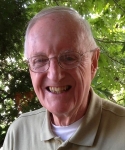
by Joseph Nangle, OFM
Pax Christi USA Ambassador of Peace
On January 22, the world-renowned Vietnam Buddhist monk, Thich Nhat Hanh, died at age 96 in the Vietnamese Tu Hieu Temple where he had been received years before as a sixteen-year-old. Hanh’s passing was noted across the world. So it seemed important to dedicate this modest essay to the “best known and most respected Zen master in the world today.”

However, at the outset here, a sincere disclaimer is in order. Bowing to scholars and experts on interreligious dialogue and more importantly those who engage in such God-inspired encounters, it must be said that these few reflections come from a relatively uninformed, but I hope thoughtful, Franciscan friar. They also are the result of my own prayerful reflections on the deep friendship Thich Nhat Hanh and Thomas Merton found in 1966.
The Buddhist monk and Roman Catholic Cistercian priest surprisingly met only one time, at Merton’s monastery, Gethsemani. However, the encounter was a profound experience judging from Merton’s description of it sometime later. “Thich Nhat Hanh is more my brother than many who are nearer to me by race and nationality, because he and I see things exactly the same way.” On the surface this coming together of the Zen master from the East and the Roman Catholic priest from the West is understandable.

Hanh had come to the United States to plead for a cessation of America’s horrifying war being waged against his country, a brutal attack on an innocent people which was diabolical in every sense and which at that moment was escalating day by day. At the same time Merton’s traditional monastic vocation had taken on an outward thrust as he felt compelled to speak out against this sinful endeavor of his own country. Obviously, Hanh and Merton shared this common objective long before they met and they found in each other, a Vietnamese monk and an American monk, common purpose.
But that May 26, 1966 meeting established an even deeper bond between the two. It was “friendship at first sight”, the coming together as soul-mates, a relationship which went far beyond and deeper than the struggle for peace which each one shared. It crossed religious, social, political and cultural boundaries. It was “friendship” in its deepest sense; as one writer had put it: coming to know another person as God knows and loves them. It must have made their hearts sing when each one came to see in the other what Hanh later described in speaking about the contemplative vocation they shared:
“Meditation is not to escape from society, but to come back to ourselves and see what is going on. Once there is seeing, there must be acting. With mindfulness we know what to do and what not to do to help.”
For Pax Christi and for all seekers of a nonviolent world, their friendship has enormous lessons to teach. At an individual, micro-level it opens perhaps heretofore undiscovered dimensions. In this increasingly intertwined common home of ours the possibilities for similar personal encounters and friendships are more possible than ever – if we seek them. Or as the liberation theologians put it: “if we go out to the encounter” with those whom we formerly considered outside of our comfort zone. They can flourish despite geographical distances. The two forged a friendship of which we are all capable.
At a macro-level the unique friendship between Thich Nhat Hanh and Thomas Merton points to a crucial need in our world today – seeing ourselves as members of one human family, bound together in our beautiful but fragile common home and dependent on each other for our very survival. Their friendship set aside all of their differences and exemplified our deepest common identity as human beings made in the image and likeness of a loving, caring Holy Mystery.
Joe Nangle OFM is a Pax Christi USA Ambassador of Peace. As a member of the Assisi Community in Washington, D.C., he is dedicated to simple living and social change. Joe also serves as the Pastoral Associate for the Latino community at Our Lady Queen of Peace, Arlington, Virginia.

This model for human friendship is much needed today especially between people with dissimilar backgrounds. Also the idea of meditation, emptying and going inside one’s self to rest in the ground of being and collect one’s self for the important work of peace that surrounds us. These two men were needed in their day but no less than their their attributes are need in these days f of social fracture. The specter of war looms again and oil is king of conflicts. Climate Change has been written off as a delusion of those who want to save the Earth and all life it sustains. Thank you Fr Nagle for this timely account of two great men.
Love this remembrance of both these men whose words have formed and shaped my life, particularly Thich Nhat Hahn in his Mindfulness teachings which become the sacrament of the present moment.
I was deeply moved by a week long retreat I attended by Thich Nhat Hanh in 1993: both his teaching and his person, which radiated peace, happiness, and calm. I later saw him speak on two other occasions. He has made me a better person and Christian. I also deeply admire Thomas Merton. We can not work for justice and peace outside ourselves if we don’t also have peace inside ourselves. This is so important for us to understand today with a society that is so angrily divided and intolerant of the opinions (and humanity) of others.